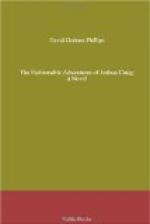CHAPTER VIII
MR. CRAIG CONFIDES
Craig did not leave Margaret more precipitately than he had intended; that would have been impossible, as he always strove to make his departures seem as startling and mysterious as a dematerialization. But he did leave much sooner than he had intended, and with only a small part of what he had planned to say said. He withdrew to think it over; and in the long walk from the Severences to his lodgings in the Wyandotte he did think it over with his usual exhaustive thoroughness.
He had been entirely sincere in his talk with Margaret. He was a shrewd judge both of human nature and of situations, and he saw that a marriage between Margaret and Grant would be in every way admirable. He appreciated the fine qualities of both, and realized that they would have an uncommonly good chance of hitting it off tranquilly together. Of all their qualities of mutual adaptability the one that impressed him most deeply was the one at which he was always scoffing—what he called their breeding. Theoretically, and so far as his personal practice went, he genuinely despised “breeding”; but he could not uproot a most worshipful reverence for it, a reverence of which he was ashamed. He had no “breeding” himself; he was experiencing in Washington a phase of life which was entirely new to him, and it had developed in him the snobbish instincts that are the rankest weeds in the garden of civilization. Their seeds fly everywhere, are sown broadcast, threaten the useful plants and the flowers incessantly, contrive to grow, to flourish even, in the desert places. Craig had an instinct against this plague; but he was far too self-confident to suspect that it could enter his own gates and attack his own fields. He did not dream that the chief reason why he thought Grant and Margaret so well suited to each other was the reason of snobbishness; that he was confusing their virtues with their vices; and was admiring them for qualities which were blighting their usefulness and even threatening to make sane happiness impossible for either. It was not their real refinement that he admired, and, at times, envied; it was their showy affectations of refinement, those gaudy pretenses that appeal to the crude human imagination, like uniforms and titles.
It had not occurred to him that Margaret might possibly be willing to become his wife. He would have denied it as fiercely to himself as to others, but at bottom he could not have thought of himself as at ease in any intimate relation with her. He found her beautiful physically, but much too fine and delicate to be comfortable with. He could be brave, bold, insolent with her, in an impersonal way; but personally he could not have ventured the slightest familiarity, now that he really appreciated “what a refined, delicate woman is.”




